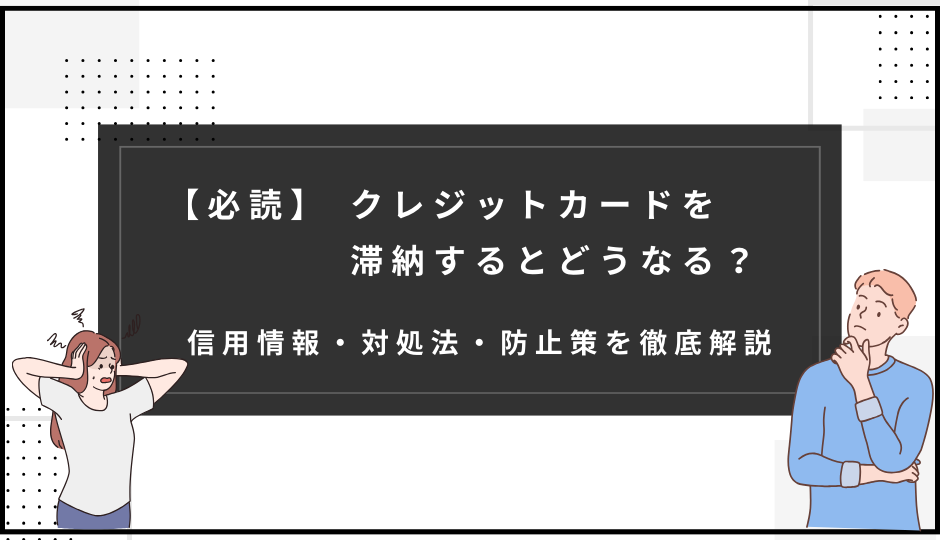

クレジットカードは、日々の買い物や公共料金の支払いなどに利用できる便利な決済手段です。しかし、利便性の高さゆえに、うっかり支払いを忘れてしまったり、手元の資金が足りずに支払いができなくなったりするケースも少なくありません。
一度でも滞納してしまうと、遅延損害金の発生、クレジットカードの利用停止、そして何よりも信用情報への影響が出てしまうことがあります。さらに滞納が長引けば、強制解約や一括返済請求、最悪の場合は財産差し押さえなど深刻な事態に発展する可能性もあります。
本記事では、クレジットカード滞納によって起こるリスクや、実際に滞納してしまったときの対処法、そして未然に防ぐための対策について詳しく解説していきます。クレジットカードを安心して利用するためにも、正しい知識を身につけておきましょう。
クレジットカード滞納で起こること
クレジットカードの支払いを滞納すると、段階的にさまざまな問題が発生します。ここでは、実際に滞納した場合に起こる代表的なトラブルについて見ていきましょう。
クレジットカードの利用停止
支払期日に引き落としができなかった場合、まずカード会社から連絡が入り、利用代金の支払いが求められます。対応が遅れると、クレジットカードは一時的に利用停止となり、ショッピングや公共料金の支払いができなくなります。特に携帯電話料金やサブスクリプションなどをクレジットカードで支払っている場合、サービス利用にも支障が出るため注意が必要です。
遅延損害金の発生
クレジットカードを滞納すると、支払期日の翌日から遅延損害金が発生します。遅延損害金は年利10〜14.6%程度に設定されていることが多く、滞納期間が長引くほど追加の支払額が増加します。たとえ数日の遅れであっても、損害金が発生するため、迅速な対応が求められます。
信用情報への悪影響
クレジットカードの支払いを滞納した事実は、信用情報機関に「延滞情報」として登録されます。この情報は、他の金融機関にも共有されるため、新たなクレジットカードの発行や住宅ローン、自動車ローンなどの審査に悪影響を及ぼすことになります。信用情報に傷がつくと、数年間は記録が残り、日常の金融取引に大きな支障をきたす恐れがあります。
クレジットカードの強制解約・一括請求
滞納状態が続くと、クレジットカード会社は契約を強制的に解除する措置を取る場合があります。強制解約後は、未払い分が一括で請求されることになり、分割払いやリボ払いを選択していた場合でも全額をすぐに支払う必要が出てきます。この段階になると、金銭的な負担はさらに大きくなります。
財産差し押さえのリスク
クレジットカード会社からの連絡や督促に応じず、長期間滞納したままにしていると、最終的には法的手続きに発展する可能性があります。裁判所から支払い督促や訴状が届き、それでも対応しなければ、給与や預貯金、場合によっては家財の差し押さえが行われることもあります。こうなる前に、できるだけ早い段階で対処することが重要です。
クレジットカード滞納時の対処法
クレジットカードの支払いを滞納してしまった場合、できるだけ早く適切な対応を取ることが重要です。ここでは、実際に滞納してしまった際に取るべき行動について解説します。
カード会社へすぐに連絡する
支払いが間に合わなかった場合、まず最優先ですべきことは、クレジットカード会社への連絡です。自ら連絡を入れることで、返済の意思を示すことができ、支払い方法の相談や再引き落としの案内を受けられることもあります。放置しておくと「支払う意思がない」と判断され、より厳しい対応につながる可能性があるため、早期連絡が大切です。
滞納分を速やかに入金する
再引き落とし日が指定されている場合は、それまでに指定口座に必要金額を入金しておきましょう。また、再引き落としがない場合は、カード会社指定の口座に直接振り込みを行う必要があります。手続きの方法は会社によって異なるため、案内に従って対応してください。
支払い方法を見直す
すぐに支払うことが難しい場合は、リボ払いや分割払いへの変更を検討するのもひとつの方法です。利用金額を一定額ずつ支払うことで、月々の負担を軽減できます。ただし、リボ払いや分割払いには手数料や利息が発生するため、無理のない返済計画を立てることが重要です。
他の資金調達手段を検討する
一時的な支払い困難であれば、公的制度の活用や、家族・知人からの借入れも検討しましょう。また、クレジットカード会社によっては専用の融資制度や、支払い猶予プランが用意されているケースもあります。困ったときは、複数の選択肢を冷静に見極めることが大切です。
クレジットカード滞納を防ぐ方法
クレジットカードの滞納は、日頃のちょっとした工夫で未然に防ぐことが可能です。ここでは、滞納を防ぐための具体的な対策について紹介します。
利用状況と口座残高をこまめに確認する
滞納の多くは「うっかりミス」や「残高不足」が原因です。カードの利用状況や口座残高を定期的に確認する習慣をつけることで、支払い遅延を防ぐことができます。クレジットカード会社のアプリやWEB明細を活用すれば、手軽にリアルタイムで確認できます。
引き落とし日をリマインドする
引き落とし日をスマホのカレンダーやリマインダー機能で通知設定しておくことで、「忘れていた」というトラブルを避けられます。複数のカードを利用している人は、それぞれの引き落とし日を整理して管理することが大切です。
自動入金・振替設定を活用する
給与口座とクレジットカードの引き落とし口座が別の場合は、自動入金や自動振替サービスを設定することで、残高不足を防ぎやすくなります。あらかじめ引き落とし日前に必要金額を移動させておくことで安心です。
支払いを調整したいときはRentEaseを活用
「支払期日までに手元の現金が間に合わない」という場合は、家賃支払いサポートサービスの「RentEase」のように、クレジットカードを利用して支払いタイミングを調整できる仕組みも有効です。RentEaseを利用すれば、クレジットカードで家賃や固定費を立替払いし、銀行引き落とし日まで支払いを先延ばしすることが可能です。急な出費や資金繰りのタイミング調整にも役立ちます。
H3:4.5 利用金額を把握して使いすぎを防ぐ
毎月の収入に見合ったカード利用を心がけることも、滞納を防ぐためには不可欠です。必要以上に利用枠を広げず、利用額の目安を決めておくと安心です。カードの使いすぎに気づけるよう、月末や締め日前には利用額を振り返るようにしましょう。
それでも払えないときの最終手段
どんなに対策を講じても、経済的にどうしてもクレジットカードの支払いが難しい状況になることもあります。そうしたときは、無理をせず、早めに他の支援制度や専門機関を頼ることが重要です。
債務整理を検討する
長期にわたる支払い困難が続く場合、「債務整理」を検討するのも一つの手段です。債務整理には任意整理・個人再生・自己破産などの手続きがあります。弁護士や司法書士に相談することで、返済額の減額や利息の免除などが可能になるケースもあります。
ただし、債務整理を行うと、信用情報機関にその事実が記録され、一定期間(5年〜10年程度)は新たなローンやクレジットカードの契約が難しくなる点には注意が必要です。
専門機関への相談
支払いに悩んだら、まずは一人で抱え込まずに専門機関に相談しましょう。たとえば、「日本クレジットカウンセリング協会」や「日本司法支援センター(法テラス)」などでは、無料で債務相談に応じてくれる支援サービスがあります。返済計画の立て直しや、法的手続きのサポートを受けることも可能です。
公的制度・生活支援の活用
一時的な収入減少や失業などで経済状況が厳しい場合は、各自治体で提供されている生活支援制度も視野に入れましょう。住居確保給付金、生活福祉資金貸付制度など、家賃や生活費の補助が受けられる制度もあります。クレジットカードの支払いにも間接的に充てられる可能性がありますので、該当する制度を早めに調べておくことが大切です。
まとめ
クレジットカードの滞納は、誰にでも起こりうる問題です。しかし、滞納を放置すると利用停止や遅延損害金の発生、信用情報への傷、最悪の場合は裁判や財産差し押さえなど、深刻な事態につながります。
大切なのは、支払いが難しくなったときに「すぐ行動する」ことです。カード会社への連絡や支払い方法の変更、公的支援やサービスの活用など、できる対策は多くあります。
また、滞納を未然に防ぐためには、日頃から利用状況を把握し、残高確認やリマインダー活用などの対策を習慣づけることが重要です。クレジットカードは「信用」で成り立つ仕組みですから、誠実な利用が何よりも信頼を守るカギとなります。
資金繰りが一時的に厳しいときは、RentEaseのようなサービスを利用して支払いタイミングを調整することも一つの方法です。現金負担を軽減しつつ、信用情報に傷をつけずに支払いを完了できるという選択肢を持っておくと安心です。
万が一に備えた知識と行動力が、あなたの信用と生活を守る力になります。





